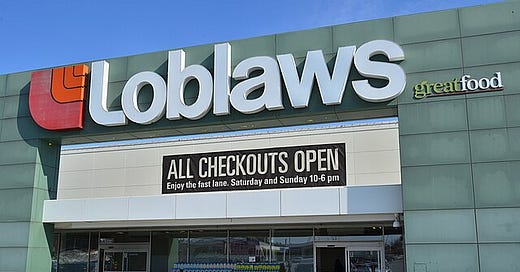Is Loblaw Prioritizing Stock Buybacks Over Lower Prices?
The three biggest grocers Loblaw, Metro, and Sobeys have collectively spent about $2.25 billion on stock buybacks in the years after the pandemic, with Loblaw notably leading this trend.
Context
Loblaw, the biggest grocery store chain in Canada, has announced its intent to purchase 15.3 million shares of its own company as part of a stock buyback program for the upcoming year. Additionally, George Weston Ltd., Loblaw’s parent company, has also initiated a stock buyback program for 6.6 million shares.
Analysis
The goal of a share buyback is to enhance shareholder value by reducing the total number of shares available on the market. This works to boost their value, as profits are now spread over fewer shares.
Loblaw’s announced buybacks are part of what are called normal course issuer bid (NCIB) programs, which allow brokers to repurchase shares on behalf of the companies without requiring day-to-day management involvement.
Under Canadian securities law, NCIBs are restricted to purchasing only 5 percent of a company’s shares over a one-year period. The intention behind this limitation is to prevent companies from having too large an influence on their share value.
Loblaw's current plan to repurchase 15.3 million shares between May 2024 and May 2025, is an increase from last year, when they repurchased 13.8 million shares between May 2023 and May 2024, spending a total of $1.8 billion.
From 2022 to 2023, Loblaw repurchased 16.6 million shares worth $1.9 billion. Over these years, the total share repurchases amounted to approximately 5 percent of available shares.
Loblaws is headed by Galen Weston, the former president of Loblaw and the current chairman. He was replaced in 2022 by Per Bank, in the face of increased public scrutiny over record profits of Loblaw in times of inflation.
He remains as chairman and CEO of George Weston Ltd, which owns controlling shares of Loblaw, at 53 percent.
Galen is part of the Weston family, one of Canada's most influential and wealthiest families, known for their significant role in the country's retail and food industries through their holdings in George Weston Ltd. and its subsidiaries. They own about 63 percent of George Weston Ltd.
By repurchasing stock in Loblaw, it indirectly raises the value of the stocks held by Weston Ltd, who is also engaging in stock buybacks.
Stock buybacks are facing increasing scrutiny in Canada and the United States. In the fall economic statement of 2023, the Canadian government announced a plan to implement a two percent tax on share buybacks, with an exception for smaller companies whose equity purchases for the year are less than $1 million.
This was passed under Bill C-59, with the goal of "raising revenue while encouraging large corporations to reinvest in their workers and businesses."
The tax was introduced for similar reasons as a comparable one percent tax in the United States, with both countries expressing concern over the lack of profits being reinvested in innovation and workers.
The three biggest grocers Loblaw, Metro, and Sobeys have collectively spent about $2.25 billion on stock buybacks in the years after the pandemic, with Loblaw notably leading this trend. This spending also reflects a broader pattern of Canadian companies which have increased stock buyback expenditures by 101 percent since 2015.
Grocer buybacks have caused significant controversy as they have occurred alongside significant accusations of "greedflation". A parliamentary inquiry on food inflation that saw Galen Weston called in to explain the behaviour of Loblaw.
Notably, all three grocers also decided to stop paying the extra $2 per hour "hero pay" given to employees at the beginning of the pandemic, citing an inability to continue paying higher wages. However, by some estimates, the funds used for stock buybacks were twice the amount needed to cover the cost of this pay for all employees.
Since 2021, food inflation has consistently outpaced general inflation across the economy, and in 2023 it exceeded double the general inflation rate.
This trend has continued into 2024, with food prices rising 2.4 percent higher than 2023, outpacing the inflation rate of 1.6 percent. Food retailers have also maintained elevated profit margins approximately one-third higher than pre-pandemic levels, increasing from 1.62 percent between 2018 and 2020 to 2.85 percent between 2020 and 2023.




